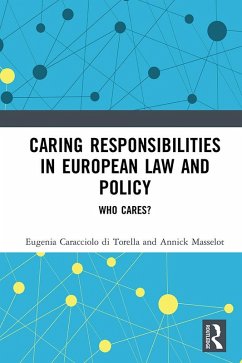
Caring Responsibilities in European Law and Policy (eBook, PDF)
Who Cares?
Versandkostenfrei!
Sofort per Download lieferbar
41,95 €
inkl. MwSt.
Weitere Ausgaben:

PAYBACK Punkte
21 °P sammeln!
This book explores the emerging engagement of EU law with care and carers.The book argues that the regulation of care by the EU is crucial becauseit enables the development of a broad range of policies. It contributes to thesustainability of society and ultimately it enables individuals to flourish. Yet, todate, the EU approach to regulating the caring relationship remains piecemealand lacks the underpinning of a cohesive strategy. Against this backdrop, thisbook argues that the EU can and must take leadership in this area by settingprinciples and standards in accordance with the values of the...
This book explores the emerging engagement of EU law with care and carers.
The book argues that the regulation of care by the EU is crucial because
it enables the development of a broad range of policies. It contributes to the
sustainability of society and ultimately it enables individuals to flourish. Yet, to
date, the EU approach to regulating the caring relationship remains piecemeal
and lacks the underpinning of a cohesive strategy. Against this backdrop, this
book argues that the EU can and must take leadership in this area by setting
principles and standards in accordance with the values of the treaty, in particular
gender equality, human dignity, solidarity and well-being. The book
further makes a case for a stronger protection for carers, who should not only
be protected against discrimination, but should also be supported, valued and
put in a position to make choices and lead full lives. In order to achieve this,
a proactive approach to rebalancing the relationship between paid and unpaid
work is necessary. Ultimately, the book puts forward a series of legal and policy
recommendations for a holistic approach to care in the EU.
The book argues that the regulation of care by the EU is crucial because
it enables the development of a broad range of policies. It contributes to the
sustainability of society and ultimately it enables individuals to flourish. Yet, to
date, the EU approach to regulating the caring relationship remains piecemeal
and lacks the underpinning of a cohesive strategy. Against this backdrop, this
book argues that the EU can and must take leadership in this area by setting
principles and standards in accordance with the values of the treaty, in particular
gender equality, human dignity, solidarity and well-being. The book
further makes a case for a stronger protection for carers, who should not only
be protected against discrimination, but should also be supported, valued and
put in a position to make choices and lead full lives. In order to achieve this,
a proactive approach to rebalancing the relationship between paid and unpaid
work is necessary. Ultimately, the book puts forward a series of legal and policy
recommendations for a holistic approach to care in the EU.
Dieser Download kann aus rechtlichen Gründen nur mit Rechnungsadresse in A, B, BG, CY, CZ, D, DK, EW, E, FIN, F, GR, HR, H, IRL, I, LT, L, LR, M, NL, PL, P, R, S, SLO, SK ausgeliefert werden.













